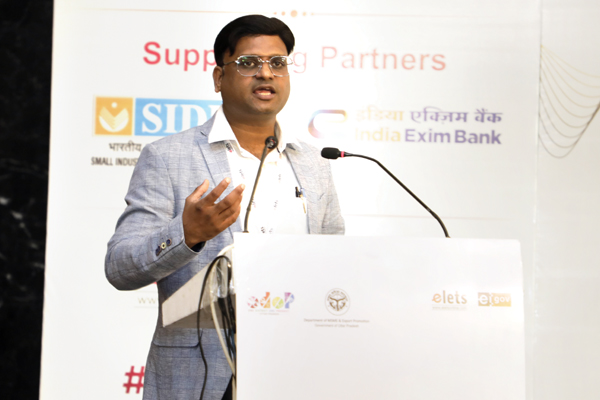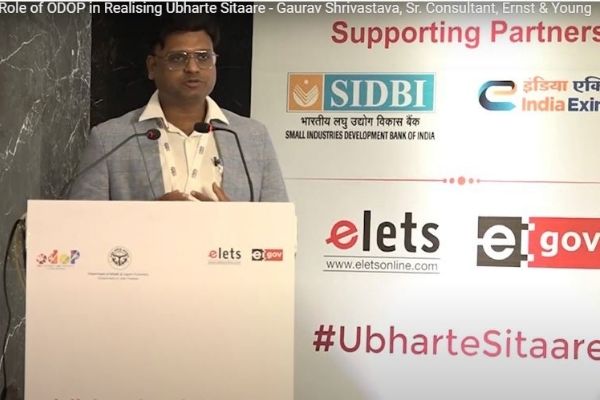
In a developmental move, the Government of Uttar Pradesh is implementing the Ubharte Sitaare programme that aims to handhold exporters in the state and help them in boosting exports and venturing into new markets. At Ubharte Sitaare of Uttar Pradesh Conference-cum-Expo, Gaurav Shrivastava, Senior Consultant, Ernst & Young addressed the session themed – Ubharte Sitaare Programme (The Role of ‘ODOP’ in Smoothly Rolling Out the Fund in State).
Shrivastava commenced his address by saying, “ODOP is a unique programme that was started by the Chief Minister of Uttar Pradesh Yogi Aadityanath in January of 2018. It is a flagship programme of the Uttar Pradesh government.”
Elaborating on the idea of ODOP, Shrivastava said, “We have 75 districts in Uttar Pradesh and each district has a specific product. For example: ‘Chickenkari’ of Lucknow is popular, Silk sarees of Banaras, Leather products of Kanpur, etc. We already have numerous products but the business ecosystem for these is not mature. So artists are not getting enough financial support and exposure. Also, they lack access to the market. Looking at these issues, the Government of Uttar Pradesh decided to shortlist products and improve the business ecosystem surrounding it so that the whole chain becomes sustainable.” This scheme is similar to the Aatmanirbhar Bharat scheme launched by the Government of India, he added.

The state government, initially, shortlisted 57 products across all 75 districts of the state. These are 57 unique products, however, 10 more exclusive products were added to the list later. A diagnostic study on the shortlisted products was conducted across the state. Renowned agencies including Asian Development Bank (ADB), Pricewaterhouse Coopers (PWC), IILFS were tasked to carry out the study. The report captured all the issues and challenges related to the business ecosystem of the shortlisted products. Based on the study report, Ernst and Young (EY) prepared a detailed project report (DPR) that highlighted the needs and requirements including infrastructure needs, the capacity-building needed, technology interventions, etc.
Detailing on the execution of the projects under the scheme, Shrivastava said, “In the first phase of the implementation of the scheme, clusters were identified based on which districts are producing what products. Citing an example he said all the leather manufacturing districts like Kanpur were made part of a single cluster. Similarly, districts popular for ‘chikenkari’ were clustered together. In the second phase, the diagnostic report was made and DPR was prepared. While in phase three, Common Facility Centres (CFCs) were constituted in the districts. These centres are meant to aid the production and manufacturing in the district. From resolving issues of the artisans, craftsmen and MSMEs to bridging the infrastructural gap by providing all the services needed including a design lab if required, building storage to resolve logistic issues, organising training programmes for capacity building, etc. A minimum 20-member special purpose vehicle (SPV) would be constituted to operate these CFCs. Also, these SPVs will have to invest 10 per cent of the project cost while the government will bear the rest 90 per cent. These SPVs will be responsible for the execution of the project. In phase four, the work for building CFCs in 22 districts has already commenced. The fifth phase is more on monitoring and evolution of the project work.” The authorities have collaborated with many big companies including Amazon, Alibaba, Flipkart for CFCs.

To Watch Video Click 👇🏻
Under the ODOP scheme, the government is providing the Margin Money scheme. In this, if someone wants to open up a business related to a product identified under the ODOP scheme then the state government provide loans on subsidies rates. These aspiring entrepreneurs can apply for loans online through the ODOP website. “We would be sending our artisans, craftsmen to various national and international expos, exhibitions, trade fairs, related to the products and 75 per cent of the total cost including airfare/train fare/bus fare, freight fare of the product, and stall charges, will be reimbursed by the government under the ODOP scheme,” he said.
Speaking on training and making people aware of the technology interventions, he said, “Many people, especially those hailing from backward districts or remote areas, are unaware of technology advancements. Therefore, under the ODOP scheme, a 10-day training is conducted for such people and for those who are semi-skilled or those still using traditional methods. These programmes help the craftsmen, artisans, MSME workers in enhancing their productivity and efficiency.” Apart from the training and certification, the participants are also handed over a professional toolkit worth Rs 20,000 relevant to the product they work on, he added.
During his address, Shrivastava also acknowledged the claim by Flipkart that the e-commerce company has sold ODOP products worth up to Rs 1000 crore.
“In an effort to provide customer satisfaction on the quality of the product and mark its authenticity, we inked an MoU with the Quality Council of India (QCI) and framed quality parameters for the ODOP products. We are working on this and the product then will bear a branding of ODOP to ensure people of its authenticity,” Shrivastava pointed out. Adding on, he said, further, ODOP also signed a pact with NRLM and identified SHG women members working for ODOP products. These women will be given priority in various schemes launched under ODOP. As of now, we had already provided training to 1000 such women, however, due to COVID the programmes were halted for a while.
In fiscal 2019-20, the exports of Uttar Pradesh soared by 35 per cent, Shrivastava said this while presenting highlights of the ODOP programme. “Till date, we’ve trained 41,000 artisans under ODOP and all of them have been provided with toolkits. 15 of the ODOP products are GI-tagged and 10 are in the pipeline. The GI-tagging of tagging of geographical indicators adds authenticity to a product.” Citing the example of Darjeeling Tea, he said that the buyer buying Darjeeling Tea will be assured of quality and authenticity due to the GI-tag on it. “We are planning to GI-tag all our 67 products to assure its unique value proposition across the globe,” he added.
Under ODOP, loans worth Rs 100 crore have been provided to over 3000 artisans to date. “E-commerce platforms have been a boon for us. Addressing the fact, we have developed our e-commerce platform ‘ODOP Mart’. Through this, the artisans can directly list their products for selling online. Also, through this initiative, the government also provides handholding to the artisans and craftsmen to develop a digital catalogue of their products. For this, we have partnered with Amazon and Flipkart who have been helping the people in fetching more eyeball to their products on the e-commerce platforms.”
Shrivastava shared a success story of ‘Buddha Rice’. He said, “The farmers cultivating ‘kaala namak rice’ did not have reach to potential markets. The rice, popular due to its historical reference from Buddha, is consumed in high quantities in Japan and the far east. The rice variety is globally known as ‘sticky rice’. This rice when bought from Siddharthnagar was priced at Rs 100 per kg, however, the same grain is sold in Lucknow at a price point of Rs 180 per kg. Due to weak branding and marketing, the farmers weren’t able to crack through international markets. As a solution, we collaborated with four FPOs and linked them with Flipkart. The processing of three FPOs is underway while the one, 120-farmer-member FPO, has started operations. This FPO transformed its branding and marketing with the help of Flipkart and launched it with the name of ‘Buddha Rice’. This product is today being sold at a price point of Rs 285 per kg on Flipkart.
Concluding his address he said, “In the next five years, we will have CFCs in every district of the state. Also, we aim to have a mature operational business ecosystem under the ODOP. Further, we aim to double the number of artisans and craftsmen under ODOP promoting the scheme and helping more such talent to groom and grow. This will further expand our production, manufacturing and exports.”
Be a part of Elets Collaborative Initiatives. Join Us for Upcoming Events and explore business opportunities. Like us on Facebook , connect with us on LinkedIn and follow us on Twitter, Instagram.












